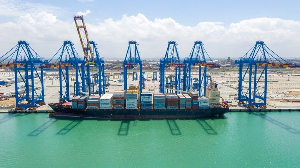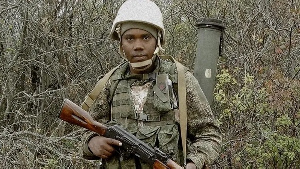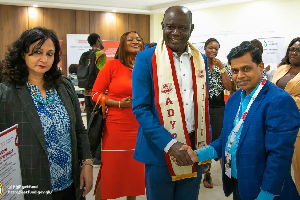Information sharing critical to aviation security - Minister
By Belinda Ayamgha, GNA
Accra, April 17, GNA - A two-day regional sub-Saharan Africa Aviation Security workshop has opened in Accra with a call on nations to collaborate and share information to ensure security in the civil aviation sector.
Mrs Cecilia Abena Dapaah, the Minister of Aviation, who opened the workshop on Tuesday, said it was ever more critical for states to increase their collaboration on issues bordering on aviation security as weaknesses in one state would affect the others.
She said the need for international cooperation as well as the promotion of a security culture was very important for aviation security.
This was highlighted by the Annex 17 of the United Nations Security Council Resolution 2309 of 2016 and the Global Aviation Security Plan (GASeP).
Mrs Dapaah said the increasingly more sophisticated and challenging nature of security threats to civil aviation calls for states to enhance international cooperation and information sharing to address such threats and achieve robust, sustainable, coordinated and cost-effective security measures in the global civil aviation system.
“It is well known that security gaps in one state, airport or aircraft, can lead to security incidents and acts of unlawful interference to civil aviation in another state. Thus civil aviation security is a shared responsibility among all states,” she said.
She called on the participants to foster a culture of security among various airport staff and stakeholders in their respective countries, aside aviation security personnel.
All levels of airport personnel, she noted, must be provided with at least a baseline appreciation and understanding of the importance of aviation security and the implications of unlawful interference.
Mrs Dapaah said the threat to aviation remained compelling thus the need for states to be proactive and vigilant and apply the most effective, protective and reactive security measures to meet the threats at national and operational levels.
In line with this, Ghana had put in place several measures to ensure security at the Kotoka International Airport and others in the country to make them safe and secure.
Mr Simon Allotey, the Director General of the Ghana Civil Aviation Authority, said the security certification programme and the regulated agents would give the regulator the assurance of standardised security measures.
“All the ground handlers, cargo operators and the personnel in the Aviation Security Unit of the GACL, will have to go through testing and once successful, will be certified,” he said.
He said the new Terminal Three will have a state-of-the-art security equipment to enhance aviation security including the full body scanners, which would be able to take a three-dimensional image of passengers and detect any swallowed objects, as well as explosive trace detectors.
The two-day workshop is aimed at building a strong collaborative network in the region to improve security in the aviation sector.
It also seeks to enhance risk awareness and response, develop security culture and human capacity, improve technological resources and foster innovation, improve oversight and quality assurance and increase cooperation and support among states.
The workshop was organised by the United Kingdom Department of Transport and the Ministry of Aviation.
Business News of Wednesday, 18 April 2018
Source: ghananewsagency.org













